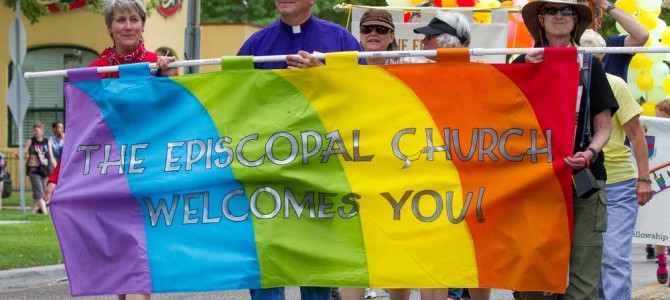
In light of the Orlando massacre, The New York Times published a forum of evangelicals writing on the question, “Have Christians Created a Harmful Atmosphere for Gays?” Two noted evangelical leaders, popular blogger Julie Rodgers and professor David Gushee, represented the “yes” perspective. Remarkably, they both hold that kindness and sincere friendship toward same-sex-attracted persons is not enough. Failing to affirm their sexuality does them harm, contributing in measure to demonic actions like Orlando. They call on Christians to repent.
Rodgers admits “The Christians I know were grieved by the massacre and they want to know how to help.” But she followed her recognition with this: “The best thing they can do is repent for the ways they’ve helped create a culture that devalues L.G.B.T. people made in the image of God, and then begin to tell a better story about us in their circles.”
Not donate blood for the injured? Not prepare food for the families? Not stand quietly with and put a sympathetic arm around those mourning at vigils and memorials? These are some of the things many Christians did without hesitation that terribly dark Sunday and the days following.
Agree With Me Or Else
But we are told such things are actually harmful if not followed by full and unqualified affirmation of same-sex relationships. Gushee says exactly this, recognizing that the “typical evangelical” thankfully rejects “hate speech or any violence toward L.G.B.T. people” but cannot adopt “a place of acceptance of gay marriages, or of L.G.B.T. people in religious leadership.” He concludes that “even polite half-acceptance leaves L.G.B.T. people in a demeaning second-class position.”
They adopt the well-worn LGBT equation: disagreement equals discrimination, denunciation, and thus danger to the same-sex-attracted person. The conclusion is illogical and manipulative to the extreme: Either you fully affirm the sexuality of the same-sex-attracted person or we will publically charge you with the sins of bigotry and violence regardless of how kind you are. The accusation is vile. There is no other word for it.
Rodgers has a solution, though. If “everyone grew up hearing that God delights in gay people and we have gifts to nourish our communities, I do not think we would be targeted for violence or discrimination.” Can she honestly believe Omar Mateen and his ilk would never do such wicked things if they had only heard such a message in their formative years? Great evil happens, unfortunately, even from those who are wonderfully parented. Happy talk is too naïve for such a serious and evil injustice.
Christianity that Endorses Sexual License Isn’t Christianity
The problem the “gay-Christian” movement faces really comes down to this. Those who seek to rewrite historic and biblical Christian orthodoxy to sanctify certain sexual relations through hermeneutic ingenuity and accusations of harm are calling for a bridge that simply cannot be built. They must construct a whole other faith to do so. There is simply no honest reading of Jesus’ words and the rest of Scripture that makes room for any sexual ethic beyond the monogamous, permanent union of a husband and wife, be it gay, straight, bi, poly, or otherwise.
So how should we then live? Christ was clear. As much as possible, always treat the person before us with extravagant, uncompromising grace and kindness. Likewise, treat the issue of sexual ethics with kind but uncompromising truth. Jesus was unequivocal about what this truth is. He affirmed the divine and exclusive nature of the husband/wife sexual union and the singularly authoritative text of Genesis 1 and 2 on such matters. He doesn’t leave us much wiggle room.
Christians are called to live faithfully in the balance and tension between the grace and truth Jesus embodied in full. We are required to live squarely in the place where we love, affirm, and work to protect everyone, accepting them as fully human, as ones toward whom God has a fatherly heart. Of course, this includes the same-sex-attracted person, as no one’s sexuality cancels out his humanity.
True Human Rights Don’t Depend on Sexuality
But affirming anyone because of his or her sexuality actually diminishes his or her humanity and the ideal of equality itself. It values them conditionally. The gay rights movement likes to make much of its supposed connection with the righteous struggle of our nation’s African-American citizens. But the abolition movement was founded on the simple but powerful question: “Am I not a man and a brother?” and the modern civil rights movement on the proclamation: “I AM A MAN.” Common humanity, not uniqueness.
The gay individual absolutely deserves love, care, affirmation, and protection because of her humanity. Nothing more can be said for a person in the case for his dignity and worth. This does not mean, however, we pretend differences don’t exist among us.
But as we strive to truly love and befriend every individual, Christians are also called to honor, teach, and live the truth of a biblical sexual ethic. This is the tension God has called us to in this and all moral issues. It is of his design and wisdom and we have no room to wish it away, much less call it evil.
To live in this tension is neither easy nor neat. But what those in the “gay-Christian” project are calling for is a violation of this and therefore simply not an option in faithful Christianity.









